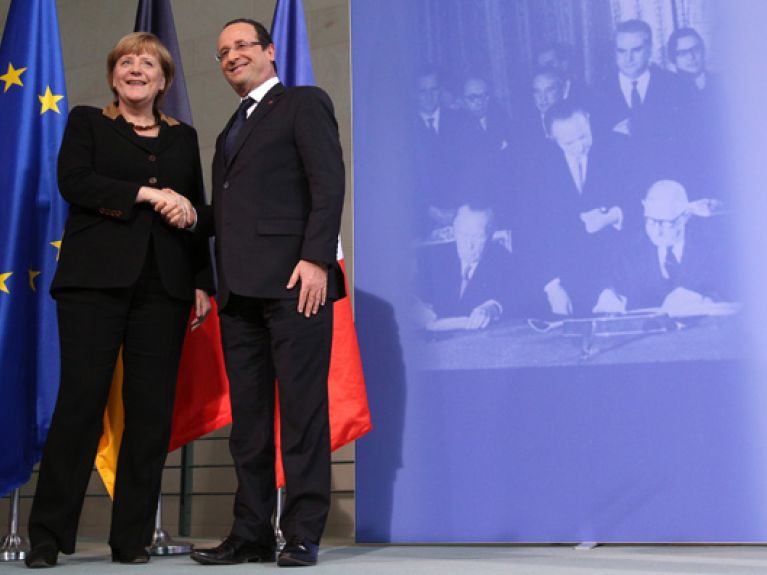A new “contrat social” for the eurozone
Between bilateralism and crisis management: what will the future of Franco-German relations bring?

The famous duet whispered into the microphone by Serge Gainsbourg and Jane Birkin, “Je t’aime... moi non plus”, has always been the ironic motto of Franco-German relations: “I love you... me neither.” It is not really possible to claim that Franco-German relations are going splendidly 50 years after the signing of the Élysée Treaty just because the large political festivities for the golden wedding anniversary were a success on 22 January in Berlin. A great deal could be said in the face of the Franco-German harmony presented on that day. After all, there is a long list of omissions, difficulties and even differences. There appear to be long-term major incompatibilities between Germany and France. Yet has the situation really ever been very different in the past?
Recently the Franco-German writer and pioneer Alfred Grosser rightly described these relations as an “enormous myth”. Whereas, for example, 82% of the Germans say their country’s relationship with France is based on equality, only 53% of the French believe the same with regard to Germany and 41% explicitly disagree with that view. The change in the symmetry of the relationship that has been emerging for some time is not without consequence for its emotional balance.
Germany and France, you will read in the Berlin Declaration on the 50th anniversary of the signing of the Élysée Treaty, have now arrived at the level of tough everyday cooperation and must find transnational solutions for the future. That includes the creation of international competitiveness, global sustainability, the modernization of cities, sustainable energy strategies, labour market reforms, the promotion of health, training programmes and border cooperation.
And yet all this is only at first glance. At second glance, it would seem that Germany and France have been given a jolt and 50 years after their “wedding” have decided to venture a second honeymoon. This is initially affirmed by the realization that after their governments, now their parliaments are moving closer together. The introduction of the European Semester for Economic Policy Coordination entails stronger social, budgetary and taxation policy coordination and therefore a societal debate on social and economic policy priorities – incidentally, not only between Germany and France.
“We will intensify our exchange with social partners to undertake joint initiatives to strengthen competitiveness while simultaneously maintaining a high level of social security,” says the joint declaration. It will now be necessary within the framework of Franco-German and European euro crisis management to examine precisely these questions: What wages are we prepared to pay? Which social benefits can we provide? What level of competitiveness do we want at what cost? At least people have now realized on both sides of the Rhine that every national change of direction in economic policy inevitably has impacts on the neighbouring country, simply because the economists of both countries now have closer ties than those of any other countries. The future will eventually show whether Paris and Berlin are in a position to jointly draft an economic and social model for Europe, at heart nothing less than a new “contrat social” for the eurozone. That is painstaking, because here France and Germany could be said to come from Venus and Mars. The clichés about differences are all too familiar: here the dirigiste, presidential, executive France; there the liberal, parliamentary, federal Germany. However, the scope for differences and therefore also for ambiguities is becoming increasingly limited. And precisely that is the new quality, the real challenge: in the face of the euro crisis the buffer zone for ambivalence is in effect reduced because the internal market also needs clear and unequivocal transnational rules in the field of social and taxation policy.
There are currently problems between Germany and France on subjects such as the banking union, on the German idea of a eurozone parliament and the sketching out of a so-called “fiscal capacity” for the eurozone. These different positions can only be considered positive by those who understand that constructive debate is the real jewel in the crown of Franco-German relations, the true driving force of progress in European integration. In that sense then, Franco-German relations have never been as good as they are today! ▪
The political scientist Dr. Ulrike Guérot is Senior Policy Fellow and Representative for Germany in the Berlin office of the European Council on Foreign Relations (ECFR).